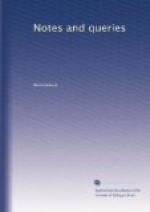“Hete_n_este” should be “hete_u_este”—“Inclosed heteueste in a stone coffin or tomb:” and in a later Query “isti_l_ed” should be “isti_h_ed”—“Let their hesmel be istihed, al without broach.”]
* * * * *
Replies to Minor Queries.
Lord Richard Christophilus.—CH. (Vol. ii., p. 130.) will probably find as much information as he requires, if he can consult a small volume in the British Museum (catalogued under the head of “Isuf, Bassa,”) of which the title is—
“A True Relation of
the Conversion and Baptism of Isuf, the
Turkish Chaons, named Richard
Christophilus, 8vo. Lond. 1684.”
Also, in the Bodleian Catalogue, under the head of “Bassa (Isuf),” CH. may find—
“The History of Isuf
Bassa, Capt.-General of the Ottoman Army at
the Invasion of Candia. 8vo.
Lond. 1684.”
In reference to the former of these volumes, there is a note in the Fasti Oxonienses, ad ann. 1683, v. Thom. White, of which the following is a copy:—
“Quaere, if Tho. White, Lecturer of S. Andrew’s Holborn, published an Epistle to the Reader of ’A True Relation of the Conversion and Baptism of Isuf, the Turkish Chaons, named Richard Christophilus, in the presence of a full congregation, Jan. 30, 1658, in Covent Garden, where Mr. Martin is Preacher. Lond. 1658. 8vo.’ Kenneth.” (Athenae Oxon. ed. Phil. Bliss, 1820, vol. iv. Fasti, coll. 392, 393.)
J. SANSOM.
Poker.—Among the muniments of the corporation of Bodmin is a certificate of the mayor and burgesses respecting the claims of the inhabitants of the town to take wood in Dunmere Wood, belonging to the Priory of Bodmin. The language of it seems to throw light on the origin of the word pocarius, or poker, which has been so often noticed and discussed. (Ante, Vol. i., pp. 185. 218. 236. 269. 281. 323. 369.) The passage also illustrates the Hook or Crook privilege, which has been already satisfactorily explained. The date is A.D. 1525:
“We say, and for truth testify that the wood called Dynmure Wood, was ever open and common to all burgesses and inhabitants of Bodmin till now of late, as well for all manner kind of their beasts to common therein, as to have their burden wood, to bear and carry away upon their backs, of lop, crop, hook, crook, and bag wood; ... always reserving to the Prior the stems of the trees for their fuel and building.”
(See the Bodmin Register, collected by the Rev. John Wallis, of Bodmin, and printed at Bodmin, 1827-1838, p. 303.)
I presume that bag wood is such wood as can be cut with a hook or crook, and bunched. In another nearly contemporary petition (Ibid. p. 306.), the same identical privilege is described by the townsmen as a right to lop and crop with a hook and crook, and to carry away on their backs, and “none other ways.” This explains the former passage, and shows that the wood was probably carried away on the back in a bag.




